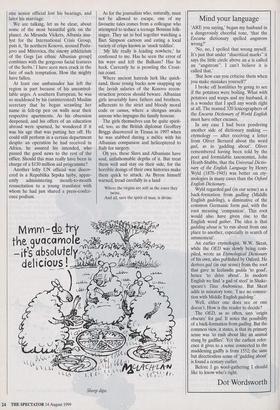Mind your language
`ARE you saying,' began my husband in a dangerously cheerful tone, 'that the Encarta dictionary spelled angstrom wrong?'
`No, no, I spelled that wrong myself. It's just that under "diacritical marks" it says the little circle above an a is called an "angstrom". I can't believe it is called that.'
`But how can you criticise them when you make mistakes yourself?'
I broke off hostilities by going to see if the potatoes were boiling. What with potatoes and wasps and my husband, it is a wonder that I spell any words right at all. The massed 320 lexicographers of the Encarta Dictionary of World English must have other excuses.
In any case I had been pondering another side of dictionary making etymology — after receiving a letter from Oliver Bernard about the word gad, as in 'gadding about'. Oliver remembered having been told by the poet and formidable taxonomist, John Heath-Stubbs, that the Universal Dictio- nary of the English Language by Henry Wyld (1870-1945) was better on ety- mologies in many cases than the Oxford English Dictionary.
Wyld regarded gad (in our sense) as a back-formation from gadling (Middle English gadeling), a diminutive of the common Germanic form gad, with the root meaning 'companion'. This root would also have given rise to the English word gather. The idea is that gadding about is `to run about from one place to another, especially in search of amusement'.
An earlier etymologist, W.W. Skeat, while the OED was slowly being com- piled, wrote an Etymological Dictionary of his own, also published by Oxford. He derives gad (in our sense) from the root that gave in Icelandic gadda `to goad', hence `to drive about'. In modern English we find 'a gad of steel' in Shake- speare's Titus Andronicus. But Skeat adds in minatory tone, 'I see no connec- tion with Middle English gadding.'
Well, either one does see or one doesn't. How is the reader to decide?
The OED, as so often, says 'origin obscure' for gad. It notes the possibility of a back-formation from gadling. But the common view, it states, is that its primary sense was `to rush about like an animal stung by gadflies'. Yet the earliest refer- ence it gives to a sense connected to the maddening gadfly is from 1552; the sane but directionless sense of 'gadding about' is found a century earlier.
Before I go wool-gathering I should like to know who's right.
Dot Wordsworth


























































 Previous page
Previous page